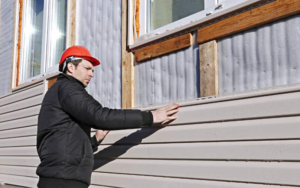A roof is a vital part of any structure that protects occupants and their belongings from the elements. It is subject to extensive wear and tear, and if it gets too damaged, homeowners should consider a replacement.
Surface repairs like patching leaks and replacing shingles are fairly simple and inexpensive. But if multiple leaks or moisture problems are evident in ceilings and walls, a complete roof replacement is a wise investment.

Roof repair is not a project that homeowners look forward to, but it is necessary to keep the structure of a home safe from damage and prevent water leaks. It can also increase the value of a property. Homeowners can extend the lifespan of their roofs with regular maintenance, but eventually they will need to replace them. A homeowner should hire a professional roofer for a thorough inspection and to handle the replacement. A roof replacement costs anywhere from $5,727 to $12,418, with the national average sitting at $9,072. The cost of a new roof depends on several factors, including the size of the roof and the materials used. The pitch of the roof also plays a role in how much it costs to replace it.
The cost of the roofing materials is one of the biggest expenses to consider. The type of shingle chosen can make a significant difference in price, and it is worth spending the extra money to get high-quality materials that will last longer and add value to the house. Some options include shingle tiles, metal roofing, and slate tile roofs.
Another big expense that can be hard to predict is the labor cost. The amount a homeowner pays for labor can vary greatly, depending on where they live and the skill level of their roofer. It is recommended that homeowners receive multiple estimates from reputable roofers in their area to get the best price.
Many homeowners may be able to save on the cost of their roof replacement by filing an insurance claim. If a homeowner’s roof is damaged by hail or other weather-related issues, the best homeowners insurance companies will cover a portion of the replacement cost.
Some homeowners may be able to get help with the roof replacement costs by applying for a personal loan or home equity loan. Homeowners should check with their mortgage company and banks to see if they offer these types of loans. They may also want to apply for a credit card that offers rewards and cash back on home improvement projects.
Warranty
As with any large purchase, you want to be sure that your investment is protected. The best way to do that is by finding a roof replacement contractor that offers both contractor and manufacturer warranties. Manufacturer warranties typically cover the quality and craftsmanship of the products installed. Contractor warranties, on the other hand, focus on the work that was performed and may also include the materials used in construction or service projects. Both play important roles in protecting the investment homeowners make with their home, and it’s crucial that homeowners understand the differences between these types of warranties.
Generally, manufacturer warranties are designed to cover the entire roofing system and state that they’ll pay for a full roof replacement if one or more components fail (excluding easy-to-replace auxiliary materials such as flashing, fasteners, and wood decking). These types of extended warranty plans can be very useful in protecting your roof investment against failures from severe weather conditions that could otherwise cost you a lot of money. However, you should note that most such warranties require that the homeowner only works with roofing contractors that are certified by the shingle manufacturer to qualify for coverage, and they can be quite expensive.
The contractor warranties that are offered by most roofing companies are designed to protect the workmanship of the installation process and ensure that all work is done correctly. These are usually more affordable than the manufacturer warranties and can be transferred to a new owner if you decide to sell your home.
Keeping your roof in top condition requires regular maintenance. Unfortunately, there are many things that can void a roof warranty. Some of these include bringing in a different contractor to perform work, not following the manufacturer’s instructions, and failing to register your warranty. While these issues can be a nightmare, it’s possible to prevent them by educating yourself about what can void your warranty and taking the necessary steps to avoid them. For more information on the protections provided by a roofing warranty, talk to a local professional today. They’ll be able to guide you on the best options for your specific situation.
Maintenance
As the barrier that keeps rain, wind, snow, and sunlight from damaging interiors and structural components of buildings, roofs are a vital part of every structure. Without a well-maintained roof, problems quickly emerge like mold and mildew, leaks, pest infestations, higher energy bills, and difficulty with resale.
Even minor damage to a roof can turn into serious problems in just a few years, so regular maintenance is a must. Depending on the type of roof, the materials, and its pitch (angle), roof repair may involve replacing sections or the entire roof.
During a maintenance program, technicians will inspect the whole roof for missing shingles, shingle curling or lifting, and nail pops. They will also look at the condition of the ridge caps, flashings, and vents. They will clear away the build-up of a soot-like substance called creosote from chimneys, and they will do a full sweep on all vent outlets and skylights.
In addition, they will examine the attic for moisture spots and stains that could be caused by a leaky roof. Stains that appear on ceilings in living spaces and bedrooms are often a sign of a roof leak, and should be addressed promptly to prevent water damage.
If there are signs of leaks or severe damage, a full roof replacement will be required. In general, any roof that has multiple layers, serious leaks, rotted decking, or missing shingles should be replaced. This is particularly true in areas that experience heavy weather conditions, such as central Ohio.
A roof is a complex structure, and it requires skilled workers to remove and replace the shingles and underlayment. It is important to choose a contractor with experience in all aspects of roof repair and replacement.
When it comes to home improvement, a new roof is one of the largest investments that can be made. However, there are many financing options available that make it possible to afford a new roof. Homeowners insurance policies generally cover the cost of a roof replacement after a certain period of time, and mortgage companies offer renovation loans that are based on the estimated value of your home after you upgrade the roofing system.

